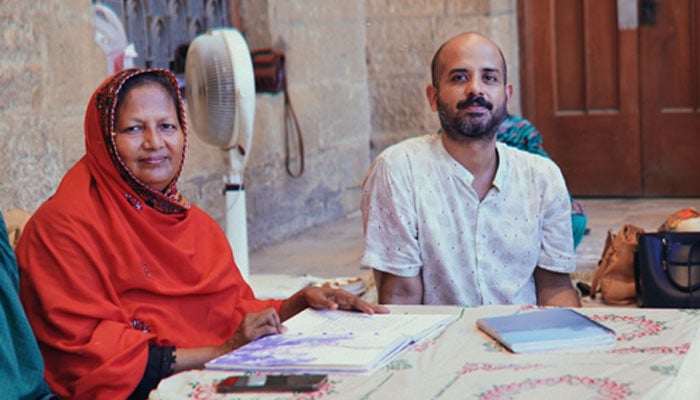
Via a fairly easy but immensely highly effective set up titled “The desk — a challenge house,” Fatima Majeed, the daughter of a fisherman from Ibrahim Hyderi, a fishing village within the Malir District of Karachi, captured the hearts of holiday makers on the 4th Karachi Biennale, themed “Rizq and Danger”.
Working alongside Karachi-based artist Fazal Rizvi, Fatima utilised artwork as an instance the extreme connection between her neighborhood and the ocean, bringing to gentle the affect of local weather change on a standard lifestyle. The exhibit displayed her neighborhood’s spirited tradition and traditions whereas foregrounding their pressing battle for survival within the face of environmental degradation. The exhibit narrated the story of a individuals who have banked on the ocean for generations however now discover themselves helplessly watching the local weather change destabilise their setting, worrying for his or her future.
Fatima’s mission — from ocean to artwork activism
Fatima, who comes from a household of fishermen, is a unprecedented artist, a storyteller, and a local weather activist. Rising up by the Arabian Sea, she has firsthand expertise of intently understanding the connection between her household’s livelihood and the delicate ecosystem surrounding it. For generations, her neighborhood has survived on the ocean’s abundance, discovering in it not simply meals and earnings however a cultural id. Nevertheless, that id is now confronted with an existential menace.
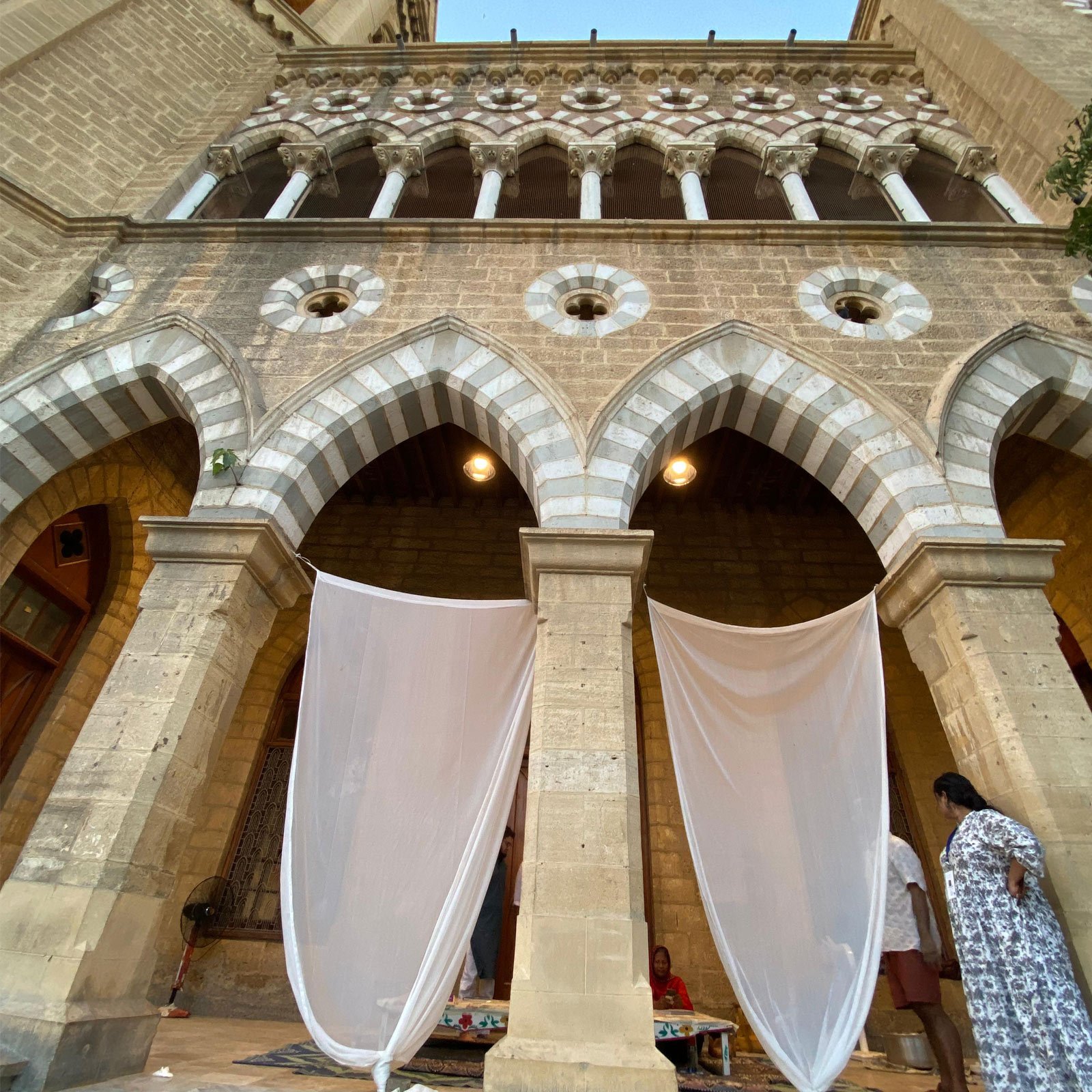
For a few years, Fatima has been working to ask outsiders to look into her world, organising cultural excursions that provide glimpses of the fishing neighborhood. Guests pattern the neighborhood’s seafood, see their each day lives, and listen to tales about their relationship with the mangroves, that are important to their fishing financial system.
This yr, nevertheless, Fatima took a shot at reaching out to a fair bigger viewers by means of the biennale exhibit. Her aim was to focus on not solely the neighborhood’s resilience and satisfaction but in addition the challenges they face as “kids of the ocean,” residing on the frontlines of local weather change.
“I wished individuals to see what it’s actually like for us,” Fatima mentioned. “Via our meals, our traditions, and our tales, I wished them to grasp the challenges we face and the bond we’ve with the ocean. We’re combating a battle to guard the mangroves and our livelihoods; my individuals and I’ve been protesting for years, organising rallies and marches to guard our neighborhood and our solely supply of livelihood — the mangroves. If misplaced, it’s not simply us, the fishermen, who will undergo; each soul residing in Karachi will really feel the results and shortage of meals can be the very first thing to hit us in future.”
The exhibit: The desk — a challenge house
The exhibit on the biennale was constructed round two easy however highly effective parts. The primary was a e book, “Samund Hiq Piyalo,” designed by Fazal’s workforce, capturing the fishermen neighborhood’s cherished seafood recipes. Nevertheless, the e book was greater than a cookbook; it was a cultural and environmental chronicle.
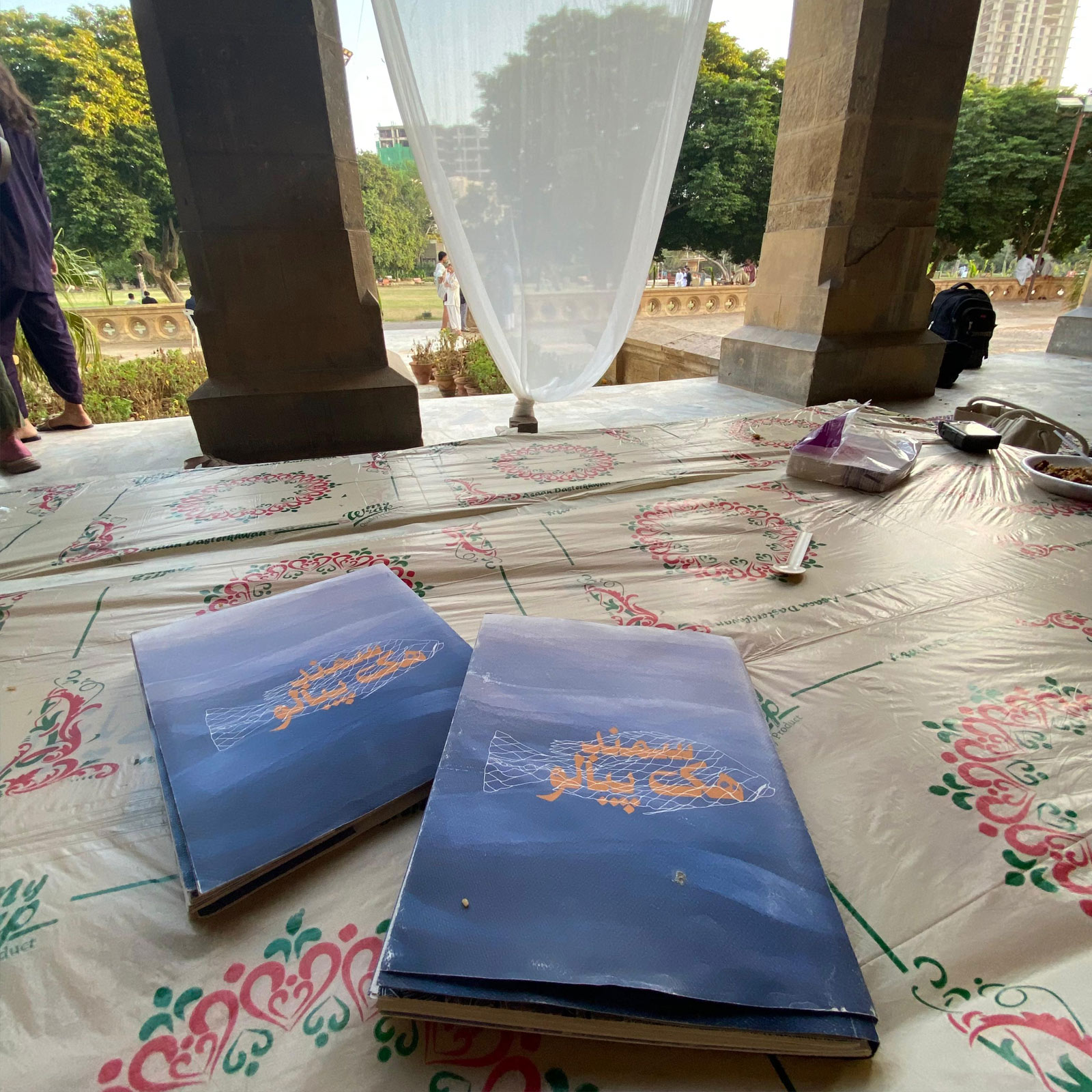
Along with recipes, Fatima included tales of her individuals’s struggles, their intimate relationship with the ocean, and the way local weather change has affected their each day lives. Every recipe held in itself a world of reminiscences, and every web page advised of the mixed resilience of a neighborhood that’s largely invisible to the general public eye.
“The desk — a challenge house isn’t nearly meals,” Fatima defined. “It’s a report of who we’re and the challenges we face. It tells the tales of our lives, our work, and our connection to the ocean. It’s about our resilience and our hope, whilst we watch the issues we love slip away.”
The second ingredient of the exhibit was the communal desk itself, additionally designed by Fazal’s workforce. The desk’s design was impressed by the colourful, hand-painted boats utilized by her neighborhood.
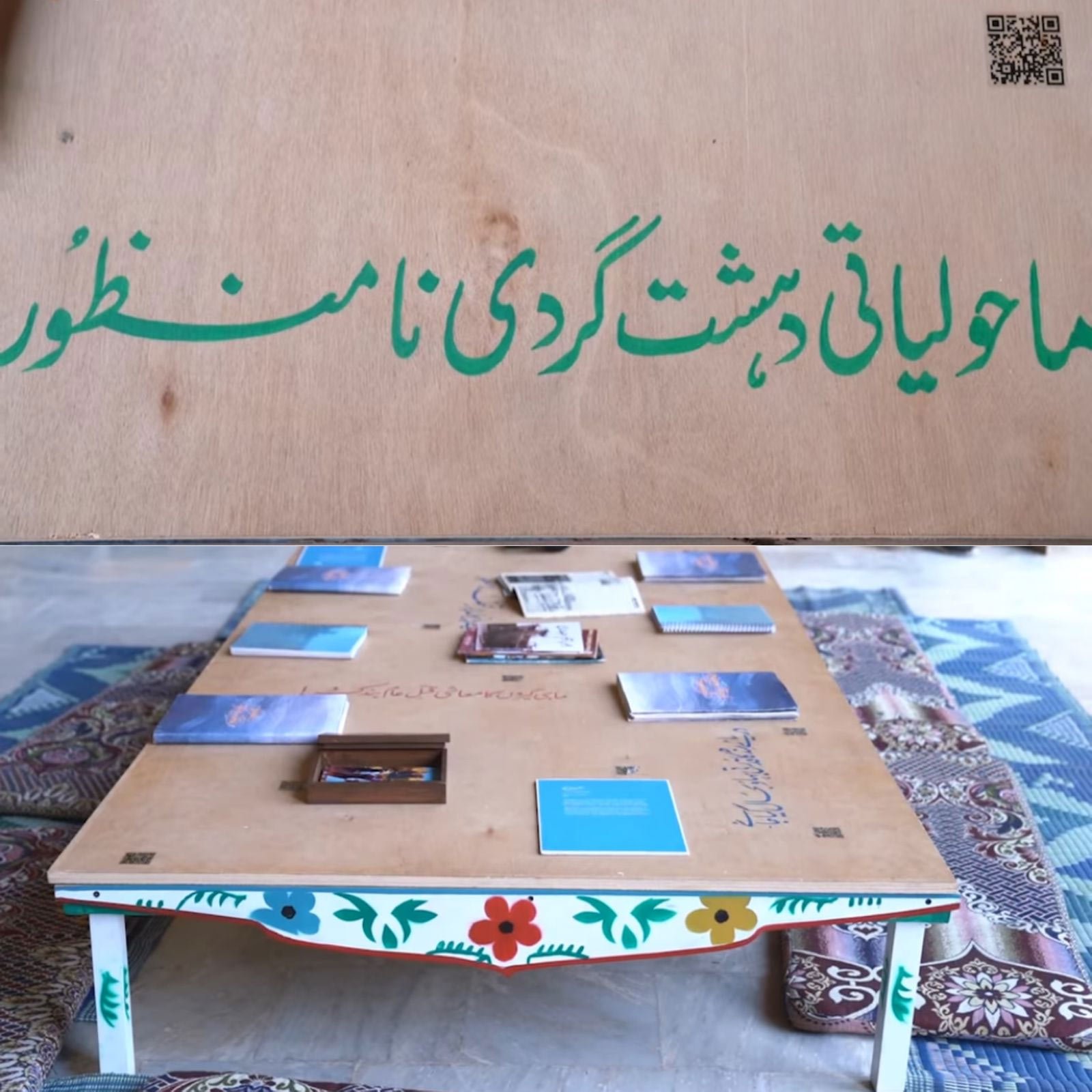
With no chairs, and solely cushions on the bottom, the desk invited guests to sit down near the earth, simply as her neighborhood does when sharing meals. Fatima sat with company across the desk, taking them on a “tour” by means of the lives and struggles of Ibrahim Hyderi’s individuals, sharing their tales, heritage, and the challenges they now face. The desk was embellished with colors and floral patterns impressed by the fishermen’s boats, representing the neighborhood’s spirit and resilience. Each element, from the absence of chairs to using cushions, was meant to present guests the expertise of a neighborhood that has lived near the land and sea for hundreds of years.
A neighborhood on the frontline of local weather change
For her neighborhood, the ocean has been the supply of livelihood for generations. However as we speak, with sea ranges rising, climate patterns going erratic, and air pollution remaining unchecked, their lifestyle is underneath menace. Mangroves, that are the pure boundaries towards surging storms and likewise important habitats for marine life, are vanishing. The lack of the plenty of those tropical timber is devastating not only for the fishermen however for Karachi as a complete, as they play an important position in defending town’s coast.
“To us, the mangroves are like saints,” Fatima mentioned. “They defend us, they offer life to the fish and prawns, they protect us from storms. However now, with local weather change, it’s like we’ve angered the ocean by polluting it. The stability feels so fragile now, and we’re dropping all the things that sustains us.”
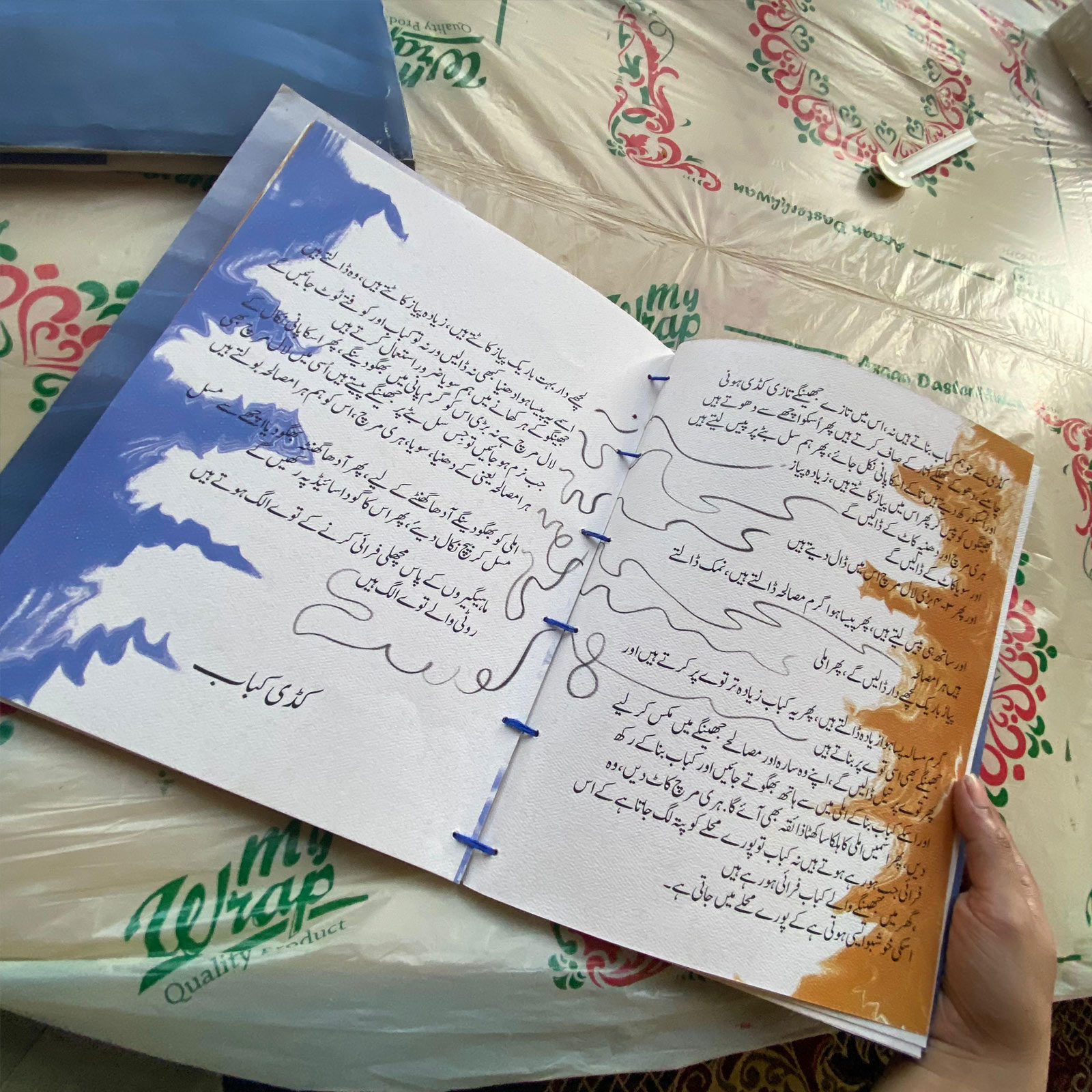
With out these pure boundaries, fishermen are pressured to journey farther out to sea looking for fish and different objects, typically with out the right tools. In the meantime, giant business ships and trawlers encroach on their fishing grounds, compounding the difficulties they already face. Fatima, talking for her neighborhood, delivered to gentle the big dangers this phenomenon poses to their livelihood and well-being.
“We’re those who make fish out there on the markets,” Fatima shared. “However the tides are altering, and so is the ocean. We’re having to battle tougher and journey farther simply to seek out what was near house. The waters aren’t as forgiving as they was; I’m afraid if it vanishes then what’s left for us? We’re depending on water.”
A name to guard mangroves and sea
Greater than a celebration of her neighborhood’s tradition, the exhibit was a daring name to motion. Her true aim is to make the individuals of Karachi and the nation’s leaders realise that defending the mangroves and addressing local weather change isn’t simply her neighborhood’s battle. If the mangroves are gone, everybody who depends on the coast can be impacted.
“If we don’t rethink our relationship with the mangroves, the ocean, and nature itself, we might lose all the things,” Fatima warned. “And it received’t simply be our loss. When the mangroves are gone, Karachi loses its protect, and each Karachiite pays the worth.” Her phrases have been each a warning and a plea, a reminder of the fragility of pure ecosystems and the pressing want to guard them.
An expertise grounded in custom and unity
On the desk, the guests have been invited to sit down, pay attention, and join with a world far faraway from Karachi’s city sprawl. The expertise was extra than simply gathering consciousness; it was deeply emotional, a uncommon alternative to really feel the heart beat of a neighborhood residing in concord with the and by the ocean. Explaining the target behind the exhibit’s design, Fazal, who joined forces with Fatima on the challenge, mentioned: “We wished individuals to really feel grounded. The desk is impressed by the boats of the fishermen; the colors, the patterns, all the things displays the lifetime of the fishermen, a life that’s wealthy in custom and that means.”
The affect of this exhibit lingered within the minds of moved guests lengthy after the shut of the biennale.
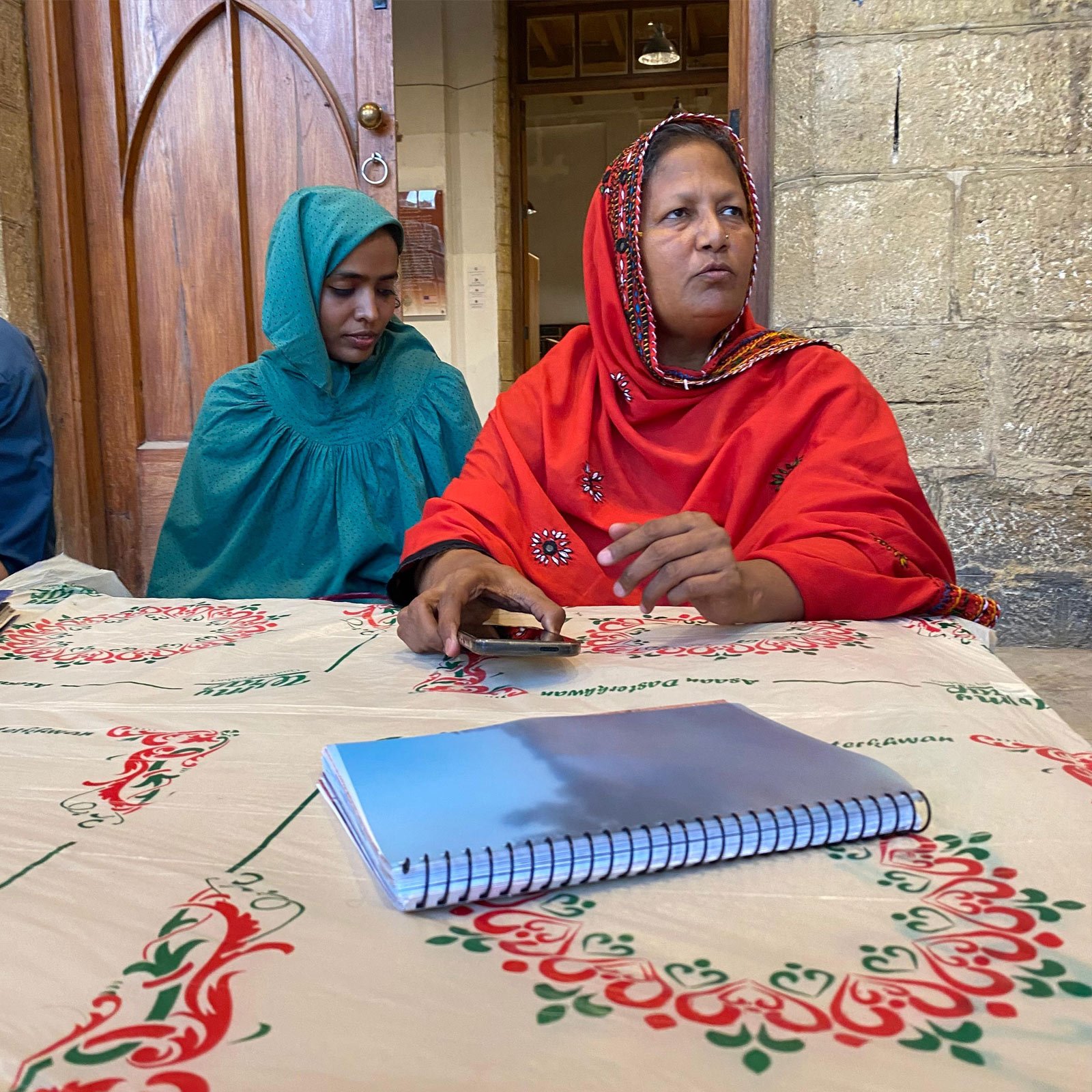
Via a e book and a desk, Fatime efficiently managed to inform a narrative of resilience, love for the ocean, and the urgent have to take motion to first decelerate after which undo local weather change. Her message was easy but sound: the destiny of the mangroves, the ocean, and the fishing neighborhood is tied to the way forward for Karachi itself.
“Our wrestle is one in all survival, however it’s additionally about preserving a lifestyle that belongs not solely to us however to everybody who calls Karachi house. We are able to’t do that alone. We have to pay attention, respect, and defend the world that sustains us all. This time I selected artwork, moderately than protesting and marching with the hope that this can make a distinction this time,” Fatima mentioned summing it up.
The fisherman’s daughter proved that a number of the strongest messages come not by means of grand gestures however by means of the tales of on a regular basis lives formed by the sweetness — and the danger — of nature.
